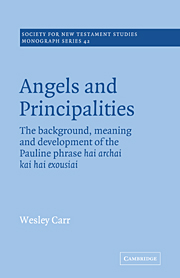 Angels and Principalities
Angels and Principalities Published online by Cambridge University Press: 06 January 2010
Ephesians
The problem of the authorship of Ephesians is far more acute than that of Colossians. The question may for the time being be left in doubt, but this cannot be made an excuse for the omission of the epistle from a study of Pauline thought on the powers. In dealing with any theme of Pauline theology attention should at least be given to any common ground between the recognised writings and Ephesians. The present approach, therefore, will be to consider the subject of the powers and connected ideas in this epistle and then to compare the findings with Paul's writings elsewhere.
The heavenly world is mentioned frequently in the letter. The terms αἱ ἀρχαὶ καὶ αἱ ἐξουσίαι; occur in three passages, each of which is an exegetical difficulty. In addition, the Devil appears under several guises, and the widespread language of τὰ ἐπουρἀνια and of οι οὐρανοί demands careful investigation.
The heavenly places
Two terms for the heavenly world occur in Ephesians: τὰ ἐπουράνια is found in 1: 3, 20; 2: 6; 3: 10; and 6: 12. οἱ οὀρανοί occurs in 1: 10; 3: 15; 4: 10; and 5:9. The latter is used for the heavens when they are simply contrasted spatially with the earth. Thus in 1: 10 the earth is specifically mentioned, and in 3: 15, where the image of ‘families in heaven and earth’ is introduced, the discussion is less about the organisation of the heavenly world than about the universality of God's fatherhood.
To save this book to your Kindle, first ensure [email protected] is added to your Approved Personal Document E-mail List under your Personal Document Settings on the Manage Your Content and Devices page of your Amazon account. Then enter the ‘name’ part of your Kindle email address below. Find out more about saving to your Kindle.
Note you can select to save to either the @free.kindle.com or @kindle.com variations. ‘@free.kindle.com’ emails are free but can only be saved to your device when it is connected to wi-fi. ‘@kindle.com’ emails can be delivered even when you are not connected to wi-fi, but note that service fees apply.
Find out more about the Kindle Personal Document Service.
To save content items to your account, please confirm that you agree to abide by our usage policies. If this is the first time you use this feature, you will be asked to authorise Cambridge Core to connect with your account. Find out more about saving content to Dropbox.
To save content items to your account, please confirm that you agree to abide by our usage policies. If this is the first time you use this feature, you will be asked to authorise Cambridge Core to connect with your account. Find out more about saving content to Google Drive.